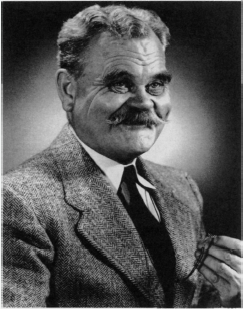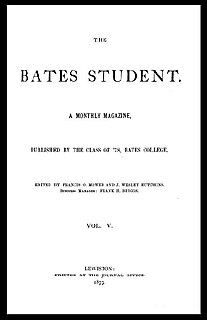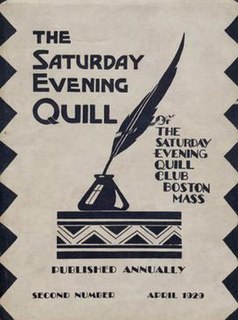Related Research Articles

Henry Wadsworth Longfellow was an American poet and educator whose works include "Paul Revere's Ride", The Song of Hiawatha, and Evangeline. He was also the first American to translate Dante Alighieri's Divine Comedy and was one of the Fireside Poets from New England.

Bowdoin College is a private liberal arts college in Brunswick, Maine. At the time Bowdoin was chartered, in 1794, Maine was still a part of the Commonwealth of Massachusetts. The college offers 34 majors and 36 minors, as well as several joint engineering programs with Columbia, Caltech, Dartmouth College, and The University of Maine.

Eavan Frances Boland was an Irish poet, author, and professor. She was a professor at Stanford University, where she had taught from 1996. Her work deals with the Irish national identity, and the role of women in Irish history. A number of poems from Boland's poetry career are studied by Irish students who take the Leaving Certificate. She was a recipient of the Lannan Literary Award for Poetry.

Percival Proctor Baxter was an American politician and philanthropist from Maine. The son of canning magnate and Portland, Maine mayor James Phinney Baxter, he served as the 53rd Governor of the U.S. state of Maine who served from 1921 to 1925. A noted philanthropist, he donated several pieces of land to the public domain including Baxter Woods (Portland), Mackworth Island State Park (Falmouth), and Baxter State Park.

Robert Peter Tristram Coffin was an American poet, educator, writer, editor and literary critic. Awarded the Pulitzer Prize for Poetry in 1936, he was the Poetry editor for Yankee (magazine).

The Pennsylvania Punch Bowl is a humor magazine published by students at the University of Pennsylvania, founded in 1899.

The Bowdoin Orient is the student newspaper of Bowdoin College in Brunswick, Maine, United States. Established in 1871, the Orient is the oldest continuously-published college weekly in the United States. It was named the second best tabloid-sized college weekly at an Associated Collegiate Press conference in March 2007. In its 2014 college rankings, The Princeton Review named it the 15th best college newspaper; Bowdoin is the smallest school and only liberal arts school to make the list. In 2018, the New England Newspaper and Press Association named the Orient the best college newspaper in New England, and the Princeton Review ranked it sixth in the nation.

Robert Ian Hamilton was a British literary critic, reviewer, biographer, poet, magazine editor and publisher.
The University of Sydney Union (USU), established in 1874, is the student-run services and amenities provider at the University of Sydney in Sydney, Australia. The USU's key services include the provision of food and beverages, retail outlets, live music and other entertainment, Clubs & Societies, festivals and events including the biggest Orientation Week (OWeek) in Australia.

The Bates Student, established in 1873, is the newspaper of Bates College in Lewiston, Maine, run entirely by students. It is one of the oldest continuously-published college weeklies in the United States and claims to be the oldest co-ed college weekly in the nation.

James Phinney Baxter was an American politician, businessperson, historian, civic leader, and benefactor of Portland, Maine. He was elected as mayor of Portland for six single-year terms between 1893 and 1905.
Charles Wilbert "Bill" Snow was an American poet, educator and politician. He served as the 75th Governor of Connecticut. He generally went by the name Wilbert or Bill Snow, or formally as C. Wilbert Snow.
Shenandoah: The Washington and Lee Review is a major literary magazine published by Washington and Lee University.
The Stonecoast MFA Program in Creative Writing is a graduate program in creative writing based at the University of Southern Maine in Portland, Maine, United States. Stonecoast enrolls approximately 100 students in four major genres: creative nonfiction, fiction, poetry, and popular fiction. Other areas of student interest, including literary translation, performance, writing for stage and screen, writing Nature, and cross-genre writing, are pursued as elective options. Students also choose one track that focuses an intensive research project in their third semester from among these categories: craft, creative collaboration, literary theory, publishing, social justice/community service, and teaching/pedagogy. Stonecoast is one of only two graduate creative writing programs in the country offering a degree in popular fiction. It is accredited through the New England Association of Schools and Colleges (NEASC).
Reed Magazine is a literary journal published by San Jose State University. Two semesters of the Department of English and Comparative Literature's 133 class solicit, edit, and promote the magazine for each year. It is the oldest literary journal based west of the Mississippi River.

The Common is an American nonprofit literary magazine founded in Amherst, Massachusetts by current Editor in Chief Jennifer Acker. The magazine, which has been based at Amherst College since 2011, publishes issues of stories, poems, essays, and images biannually. The magazine focuses its efforts on the motif of "a modern sense of place," and works to give the underrepresented artistic voices a literary space.
Gertrude Tiemer Wille was an American painter, photographer, and poet. Tiemer achieved her greatest notoriety for inter-dimensional, multi-exposure photography. Her paintings of landscapes, still lifes, portraits, and other pieces adopted both the realist and abstract styles of art. Tiemer exhibited her work at galleries in Maine, New York City, and other venues throughout the U.S. and internationally.

The history of Bates College began shortly before Bates College's founding on March 16, 1855, in Lewiston, Maine. The college was founded by Oren Burbank Cheney and Benjamin Bates. Originating as a Free Will Baptist institution, it has since secularized and established a liberal arts curriculum. After the mysterious 1853 burning of Parsonsfield Seminary, Cheney wanted to create another seminary in a more central part of Maine: Lewiston, a then-booming industrial economy. He met with religious and political leaders in Topsham, to discuss the formation of such a school, recruiting much of the college's first trustees, most notably Ebenezer Knowlton. After a well-received speech by Cheney, the group successfully petitioned the Maine State Legislature to establish the Maine State Seminary. At its founding it was the first coeducational college in New England. Soon after it was established, Canadian and American donors stepped forward to finance the seminary, developing the school in an affluent residential district of Lewiston. The college struggled to finance its operations after the financial crisis of 1857, requiring extra capital to remain afloat. Cheney's political activities attracted Benjamin Bates who was interested in fostering his business interests in Maine. Bates donated installments of tens of thousands of dollars to the college to bring it out of the crisis.

The Saturday Evening Quill was a short-lived (1928–1930) African-American literary magazine of the Harlem Renaissance. It was founded by the journalist Eugene Gordon.
Kai Cheng Thom is a Canadian writer and social worker, who has dual master's degrees in social work and couple and family therapy from McGill University. She has published four books to date: the novel Fierce Femmes and Notorious Liars: A Dangerous Trans Girl's Confabulous Memoir (2016), the poetry collection a place called No Homeland (2017), a children's book, From the Stars in The Sky to the Fish in the Sea (2017), and I Hope We Choose Love: A Trans Girl's Notes from the End of the World (2019), a book of essays centred on transformative justice.
References
The Bowdoin Quill, Vol. 1 (1987). Brunswick, ME: Bowdoin College Press.